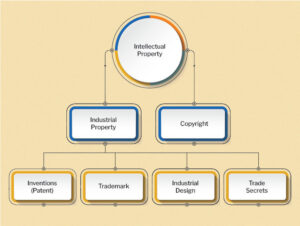In the vast expanse of the digital landscape, e-commerce businesses thrive on innovation, creativity, and unique brand identities. However, with the rise of online commerce, the threat of intellectual property theft, counterfeiting, and brand infringement has become a looming concern. Imagine spending years building a successful online brand, only to have it hijacked by competitors or counterfeiters who seek to capitalize on your hard work and reputation. The consequences can be devastating, from lost revenue and damaged brand reputation to legal battles and costly settlements. But fear not, for there are proactive measures you can take to safeguard your online empire and protect your intellectual property from would-be thieves. In this comprehensive guide, we’ll explore the world of intellectual property protection, providing e-commerce businesses with the essential strategies and tools to shield their creative assets, maintain their competitive edge, and ensure their online success.
Understanding Intellectual Property Rights for e-commerce businesses

Your e-commerce business is a unique and valuable entity that requires protection from the threats of piracy, counterfeiting, and theft. Intellectual property (IP) rights are the guardians of your online empire, shielding your creative expressions, innovations, and trade secrets from unauthorized use. As an e-commerce business owner, it is essential to grasp the fundamentals of IP rights to ensure that your brand, products, and services remain distinctive and secure. This includes understanding the nuances of copyrights, trademarks, patents, and trade secrets, as well as the legal frameworks that govern their use and protection.
Trademarks: Protect distinctive logos, symbols, or brand names that represent your business or products. Strong trademarks make it easier for customers to identify your brand and differentiate you from competitors.
Copyrights: Safeguard original creative works like product descriptions, website content, and unique product designs. Copyright protection ensures you have exclusive rights to reproduce and distribute these works.
Patents: Offer protection for novel inventions or functional designs that provide a unique benefit or solution
Trade Secrets: Encompass confidential information that provides a competitive advantage to your business. This can include formulas, processes, customer lists, or unique algorithms that are not generally known to the public.
Identifying and protecting your Intellectual Property assets
As an e-commerce business owner, you’ve invested countless hours, creativity, and resources into building your brand, products, and services. Your intellectual property (IP) is the lifeblood of your online empire, and protecting it is crucial to maintaining your competitive edge and avoiding costly legal battles. But, where do you start? The first step in safeguarding your IP is to identify the assets that need protection. This includes your brand name, logo, taglines, product designs, software, and even the content on your website. Take a closer look at your business and pinpoint the unique elements that set you apart from the competition. Are you using a proprietary manufacturing process? Have you developed a distinctive packaging design? Do you have a catchy slogan or jingle? Once you’ve identified your IP assets, you can begin to take steps to protect them. This may involve registering trademarks, copyrights, and patents, as well as implementing non-disclosure agreements and confidentiality contracts with employees and partners. By taking a proactive approach to IP protection, you can prevent unauthorized use, infringement, and theft of your valuable assets, ensuring that your online empire remains secure and thriving.
Strategies for preventing IP theft and infringement
Intellectual property (IP) theft and infringement have become a rampant threat to e-commerce businesses. As an online entrepreneur, it’s crucial to take proactive measures to safeguard your brand’s unique identity, innovative products, and valuable content from being stolen or misused. One effective strategy is to implement robust digital watermarking and fingerprinting technologies that can detect and trace unauthorized use of your copyrighted materials. Another approach is to conduct regular online searches and monitoring to identify potential infringers and take swift legal action against them. Additionally, establishing strong contractual agreements with suppliers, manufacturers, and partners can help prevent IP theft and ensure that all parties are aware of their obligations and responsibilities. Furthermore, implementing a robust intellectual property protection policy, including training and education programs for employees, can help prevent internal breaches and create a culture of IP respect within your organization. Adopting these strategies, you can significantly reduce the risk of IP theft and infringement, and protect your online empire from potential threats.
Enforcing your Intellectual Property rights: Legal remedies and options
As a business owner, it’s essential to take proactive measures to enforce your IP rights and protect your brand, products, and services from unauthorized use. When faced with IP infringement, you have various legal remedies and options at your disposal. From sending cease and desist letters to filing lawsuits, you can take legal action to stop infringers and prevent further damage. Moreover, you can also utilize online platforms and tools to monitor and report IP infringement, making it easier to identify and address potential threats. Additionally, registering your IP rights with relevant authorities, such as the U.S. Patent and Trademark Office (USPTO) or the World Intellectual Property Organization (WIPO), can provide you with stronger legal grounds to enforce your rights. By understanding your legal options and taking swift action, you can safeguard your online empire and maintain a competitive edge in the e-commerce market.
Best practices for IP protection in e-commerce: A checklist for business owners
As an e-commerce business owner, protecting your intellectual property (IP) is crucial to safeguarding your online empire. With the rise of online marketplaces and social media, it’s easier than ever for counterfeiters and competitors to steal your ideas, designs, and brand identity. To ensure your business remains competitive and protected, it’s essential to implement a robust IP protection strategy. We’ve compiled a comprehensive checklist of best practices for IP protection in e-commerce, covering everything from trademark registration to copyright infringement monitoring. By following these guidelines, you’ll be able to identify potential threats, prevent IP theft, and maintain a strong online presence that sets your business apart from the competition. From conducting regular IP audits to implementing secure payment systems, this checklist provides a comprehensive roadmap for e-commerce business owners to safeguard their intellectual property and maintain a thriving online empire.
Identification and registration
Identify your IP assets: Catalog your trademarks, copyrights, patents (if applicable), and trade secrets. This includes logos, brand names, product designs, unique product descriptions, and confidential business information.
Register your trademarks: Filing for trademark registration with the relevant authorities in your target markets strengthens your legal rights and simplifies enforcement actions if your brand is infringed.
Consider copyright registration: While copyright protection exists automatically for original creative works, registration provides additional benefits like stronger legal presumptions and easier enforcement.
Protection and enforcement
Implement watermarks and copyright notices: Embed watermarks on product images and include copyright notices on your website to deter unauthorized copying.
Monitor online marketplaces: Be vigilant about online marketplaces where counterfeit products might be sold. Utilize online brand protection tools or services to monitor for infringements.
Develop clear terms and conditions: Clearly outline your intellectual property rights in your website’s terms and conditions to deter unauthorized use of your content.
Have a plan for enforcement: Develop a clear process for responding to potential IP infringement. This may involve sending cease-and-desist letters or taking legal action in more serious cases.
Security and access control
Secure image hosting: Use a secure platform like Selly Africa that employs secure image hosting to reduce the risk of unauthorized downloads and copyright infringement of your product images.
User roles and permissions: (If you use a platform like Selly Africa) Assign user roles with specific permissions within your online store, limiting access to sensitive information (like trade secrets) based on job duties.
Secure login and data encryption: Ensure your e-commerce platform utilizes industry-standard security measures to protect user data and store information, reducing the risk of unauthorized access.
Additional considerations
Conduct regular IP audits: Periodically review your IP assets and ensure your registration and protection strategies remain up-to-date.
Educate your employees: Train your employees on the importance of IP protection and how to identify and report potential infringements.
Stay informed: Keep yourself updated on relevant IP laws and regulations, especially if you operate in international markets.
Consider insurance: Explore intellectual property insurance options to offer additional financial protection in case of infringement lawsuits.
Selly Africa: Protecting your Intellectual Property on your platform
In the vast and competitive landscape of e-commerce, protecting one’s intellectual property is crucial for the survival and success of an online business. For e-commerce platforms like Selly Africa, which connects buyers and sellers from across the continent, intellectual property protection is a top priority. Selly Africa takes pride in providing a secure and trustworthy environment for its users, and this commitment to intellectual property protection is a key aspect of that promise. By safeguarding trademarks, copyrights, and patents, Selly Africa ensures that its sellers can confidently showcase their unique products and services, while buyers can trust that they are purchasing authentic and high-quality goods. This focus on intellectual property protection not only fosters a culture of innovation and creativity but also helps to build trust and credibility among customers, ultimately driving the growth and prosperity of the online marketplace. The platform offers features to help you manage and safeguard your intellectual property:
Secure image hosting: Selly Africa employs secure image hosting to reduce the risk of unauthorized downloads and copyright infringement of your product images.
Customizable storefront: Design your online store with your unique branding elements, logos, and trademarks, fostering brand recognition and deterring potential imitators.
Content management system: Our user-friendly content management system allows you to easily update and manage your product descriptions and website content, ensuring you retain exclusive control over your copyrighted works.
In conclusion, the importance of protecting your intellectual property in the e-commerce space cannot be overstated. With the rise of online marketplaces and social media, it’s easier than ever for competitors and cybercriminals to infringe on your brand’s identity, steal your intellectual property, and undermine your business’s success. By understanding the various types of intellectual property, such as trademarks, copyrights, and patents, and taking proactive steps to protect them, you can safeguard your online empire and ensure the long-term viability of your e-commerce business. Implementing the strategies outlined in this guide, you can confidently navigate the complex world of intellectual property protection and focus on growing your business with peace of mind. Remember, protecting your intellectual property is an investment in your business’s future, and it’s a crucial step in building a strong and sustainable online presence.

